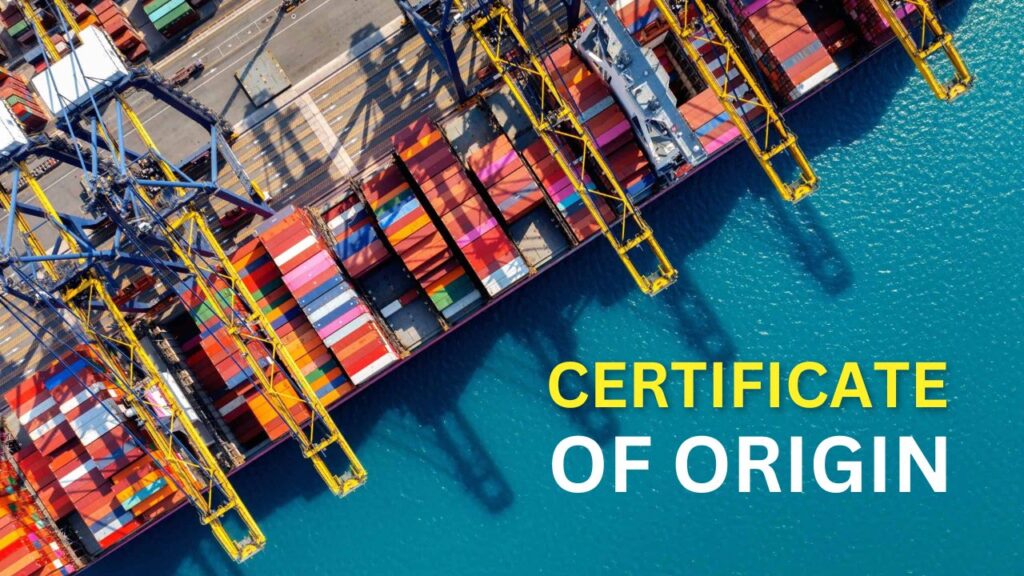How to Get Certificate of Origin in India

If you’re stepping into the world of international trade, knowing how to get Certificate of Origin in India is essential for smooth export transactions. This document proves that the goods being exported are manufactured or processed in India. Without it, many importing countries may not allow your goods to enter or may impose higher duties.
In this blog, we’ll take a detailed look at the Indian export certificate process, cover all required export documentation in India, and explore how to stay compliant with Indian export compliance guidelines.
What is a Certificate of Origin?
A Certificate of Origin (COO) is an official document that certifies the country of origin of exported goods. It’s required by customs authorities in the importing country to determine tariffs, trade restrictions, or rules of origin under trade agreements.
There are two types of Certificate of Origin:
- Preferential Certificate of Origin – for countries with Free Trade Agreements (FTAs) with India
- Non-Preferential Certificate of Origin – for general trade without special trade agreements
Whether you’re exporting textile products, food items, or industrial machinery, understanding how to get Certificate of Origin in India ensures you’re ready for cross-border shipments.
Step-by-Step Process to Get Certificate of Origin in India
Get Your IEC (Import Export Code)
Before you start with any export, getting an Import Export Code from DGFT (Directorate General of Foreign Trade) is the first step in Indian export compliance.
Register with an Authorized Chamber or Agency
COOs are issued by recognized agencies like:
- Indian Chamber of Commerce (ICC)
- FIEO (Federation of Indian Export Organizations)
- Export Promotion Councils
Each of these agencies follows the standard Indian export certificate process.
Prepare Required Trade Documentation India Needs
To apply for COO, you’ll need:
- A cover letter requesting the certificate
- Commercial invoice
- Packing list
- Bill of lading or airway bill
- Purchase order or letter of credit
- Declaration of origin
These are essential parts of export documentation in India and must be accurate to avoid delays.
Apply Online or Offline
Most chambers now offer online portals to apply. For instance, FIEO and DGFT allow digital application submissions.
Verification and Approval
The issuing authority verifies your documents and approves the COO within 1-2 working days, depending on the type and destination country.
Export License and Certificate of Origin: What’s the Difference?
Many new exporters confuse Export License and Certificate of Origin.
Here’s the difference:
| Export License | Certificate of Origin |
|---|---|
| Authorizes export of restricted items | Certifies the origin of goods |
| Issued by DGFT | Issued by Chambers/Export Bodies |
| Mandatory only for restricted goods | Mandatory for almost all exports |
| Related to Indian government permissions | Related to destination country requirements |
To meet full Indian export compliance, exporters may need both, depending on the goods and destinations.
Why Certificate of Origin is Crucial for Your Export Business
 Customs Clearance: Import countries may hold your cargo without this document
Customs Clearance: Import countries may hold your cargo without this document Preferential Tariffs: Under FTAs, COOs help you get duty exemptions
Preferential Tariffs: Under FTAs, COOs help you get duty exemptions Trust & Credibility: Builds your business reputation as a genuine exporter
Trust & Credibility: Builds your business reputation as a genuine exporter Legal Protection: Reduces trade disputes with proper documentation
Legal Protection: Reduces trade disputes with proper documentation
If you’re wondering how to get Certificate of Origin in India, it’s important to plan your documentation in line with the broader scope of trade documentation in India.
Who Needs a Certificate of Origin in India?
Any exporter sending goods outside India must understand who needs a Certificate of Origin. Whether you are a small trader or a large manufacturer, this document is mandatory to meet Indian export compliance. Without it, you may face delays or rejection in the destination country. Especially under trade agreements, the COO helps in availing preferential tariff benefits, making it a key part of trade documentation in India.
Role of Certificate of Origin in Export Documentation India
The Certificate of Origin plays a vital role in the overall export documentation in India. Along with your invoice, shipping bill, and packing list, the COO provides evidence of where your goods were manufactured. This not only supports Indian export certificate processes but is also often required by banks, customs, and trade authorities to release shipments, process payments, and settle trade agreements smoothly.
Conclusion
Knowing how to get Certificate of Origin in India is a must for anyone serious about exporting. The process might seem paperwork-heavy, but once you understand the Indian export certificate process and comply with the necessary trade documentation in India, things fall into place.
From getting your IEC to applying through an authorized agency, every step ensures you meet Indian export compliance and avoid issues at customs. And remember, in many cases, both your export license and Certificate of Origin may be required to successfully enter global markets.
Contact us for more details of & Your registration
Our team will be happy to assist you
Mobile: +91-790-200-2800
